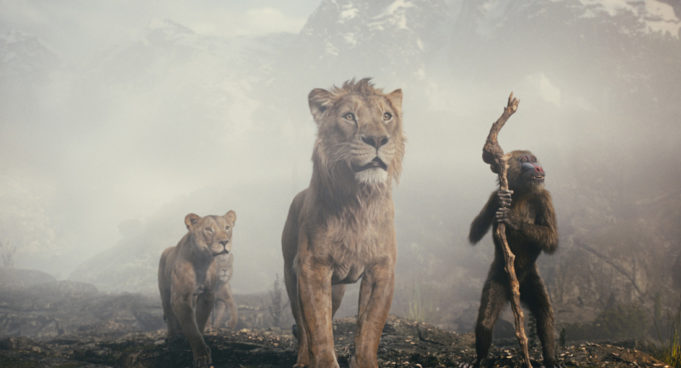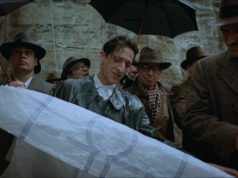Male lions are full of crap. They roar, they have manes that look cool in photographs, and they fight among themselves for control of the pride while the lionesses do all the hunting and cub-rearing that keep everything going. What credit do the females get for it? Disney’s musical prequel Mufasa: The Lion King recognizes this, which is one of the refreshing things about it. More than that, it helps make this movie more interesting, if not necessarily better, than any of Disney’s live-action remakes.
The bulk of the story takes place after little Mufasa (voiced by Braelyn Rankins) is washed away from his parents by a flood and taken in as a stray by a different pride thanks to the offices of little Taka (voiced by Theo Somolu), whose father Obasi (voiced by Lennie James) is the king of his pride. The two lion cubs grow up like brothers, and the adult Mufasa (voiced by Aaron Pierre) saves his adoptive mother from an ambush by two albino lions but not for long. The white lions belong to a pride under the leadership of Kiros (voiced by Mads Mikkelsen) that’s wiping out all the other prides, so Obasi saves Taka (voiced by Kelvin Harrison Jr.) by sending him away with Mufasa as a personal bodyguard. The two orphans make a long trek to a green place that Mufasa has heard about, under the guidance of young Rafiki (voiced by Kagiso Lediga), who knows where it is.
The framing story has Rafiki (voiced by John Kani) tell Mufasa’s story to Simba and Nala’s lioness cub (voiced by Blue Ivy Carter), and this is where much of the humor comes in. Timon and Pumbaa (voiced by Billy Eichner and Seth Rogen) act like a Statler and Waldorf of the Serengeti, commenting snarkily on the Broadway version of The Lion King and Simba singing “Hakuna Matata” with them hours after seemingly causing his father’s death. They have blessedly little patience for Rafiki’s story: “Enough childhood trauma! More meerkats!” The most gratifying joke here comes from Kiros’ villainous aria “Bye Bye,” with songwriter Lin-Manuel Miranda dinging the original Mufasa’s philosophy: “The circle of life is a lie / A pretty way to say / There are predators and prey / That circle of vultures up high / They keep stealing glances / They don’t like your chances.”
More seriously, we actually get to see Rafiki prove his mettle as a sage, counseling young Mufasa in large amounts of untranslated Swahili about the journey he must undertake. Pierre portrayed the U.S. Marine hero in Rebel Ridge earlier this year, and he brings the same calm, soft-spoken authority of that role to this project. I do like how Obasi’s faulty mentoring of the cubs — sending Mufasa to hunt with the lionesses and telling Taka that kings must lie to their subjects — sets up Mufasa picking up skills that he wouldn’t have otherwise, as well as Taka betraying Mufasa.
This is a fascinating left turn for director Barry Jenkins, who helmed Oscar-winning romances in Moonlight and If Beale Street Could Talk, and I wish I could say that working for Disney entirely suited him. Unfortunately, he seems uncomfortable with the big climax, when an earthquake strikes during Mufasa’s climactic fight with Kiros. The story elements don’t pull their weight, such as the romantic triangle between the brothers and a lioness (voiced by Tiffany Boone) who’s a refugee from another decimated pride doesn’t come off and also Taka’s ultimate transformation into Scar. Also, Miranda’s songwriting is somewhere below his best, and the five-part number “We Go Together” is a watered-down retread of “We Don’t Talk About Bruno,” complex vocal lines and all.
Still, compared to Disney’s slavish recent remakes of The Lion King, The Jungle Book, and even The Little Mermaid, this movie offers up a lot more food for thought because of its original story (and I say that as someone who’s not a fan of prequels in general). This seems like a direction that the studio should pursue, using these big-budget live-action movies to continue the stories from their animated classics rather than just rehashing them. Mufasa does this without leaving behind fans of the original — the first thing we hear is the unmistakable voice of the late James Earl Jones, to whose memory the film is dedicated. It could be the start of something great, if the boardroom guys at Disney would take the risk.
Mufasa: The Lion King
Voices by Aaron Pierre and Kelvin Harrison Jr. Directed by Barry Jenkins. Written by Jeff Nathanson. Rated PG.












